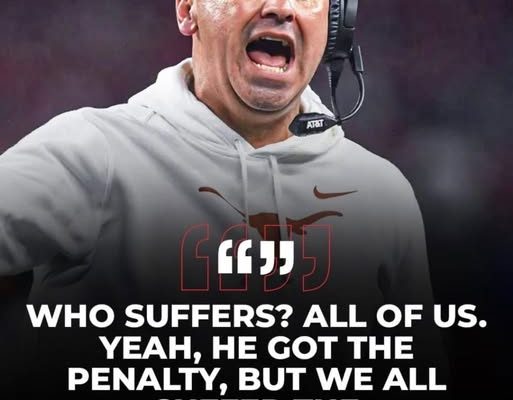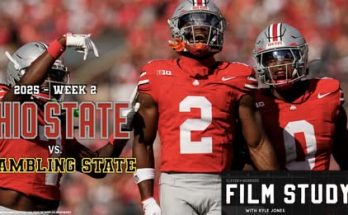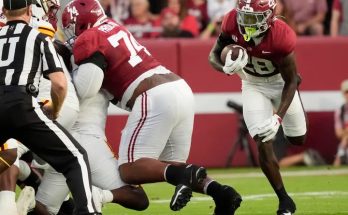The conversation around the Texas Longhorns and their penalty problem is one that refuses to go away, and Steve Sarkisian, as the head coach of one of college football’s most visible programs, sits squarely at the center of it. In a sport where execution, discipline, and details often define the thin line between winning a national championship and watching someone else hoist the trophy, the Longhorns have found themselves repeatedly hampered by self-inflicted wounds. Penalties are often brushed off by fans as part of the game, moments of human error that occur in a fast-moving sport, but in reality, they reveal something deeper about a team’s culture, preparation, and ability to remain composed under pressure. For Sarkisian, whose job is not just to recruit and scheme but also to instill discipline in his roster, cleaning up these mistakes has become as urgent as finding the right quarterback or landing the next five-star recruit.
Texas has always carried the burden of expectation. When you represent the Longhorns, you inherit a history of greats, a fanbase that demands championships, and a spotlight that shines brighter than nearly any other program in the nation. Sarkisian knew this when he accepted the job. He also knew that the Big 12, and soon the SEC, are unforgiving leagues where lapses in discipline are punished swiftly and often decisively. The issue with penalties is not simply the number of flags thrown but the timing, the types of infractions, and the situations in which they occur. A holding call that wipes away a crucial third-down conversion, an offsides penalty on fourth and short, or an unnecessary personal foul after a defensive stop—these are the kinds of mental errors that change outcomes of games and erode trust in a team’s ability to execute. Texas, under Sarkisian, has seen too many of these costly moments, and the numbers back it up.
The Longhorns have consistently ranked higher than they should in penalty yards per game, a category where elite programs almost never want to be near the top. Alabama, Georgia, and Ohio State—the schools Texas wants to measure itself against—rarely beat themselves with flags. Sure, they commit their share, but the discipline instilled in those programs is obvious when the stakes are highest. Texas, on the other hand, has struggled to match that level of poise, and the frustration among fans is growing louder. When a team is loaded with talent but repeatedly stalls drives or extends the opposition’s possessions due to sloppy infractions, the blame often comes back to coaching. Not because Sarkisian is responsible for every player’s decision on the field, but because the tone of accountability, the demand for precision, and the emphasis on fundamentals are supposed to come from the top.
Discipline in football is not about stripping players of their aggression or instincts but about channeling those qualities in a way that maximizes effectiveness without crossing the line. A great defensive end knows how to time a snap count without jumping early. A cornerback understands the fine line between physical coverage and interference. Offensive linemen must master hand placement to avoid holding calls. These are details that are drilled over and over in practice. When a team continues to falter in these areas, it raises the question of whether enough emphasis is being placed on the little things. Sarkisian has shown himself to be an elite offensive mind, someone who can design schemes that maximize his skill players and put defenses in conflict. But football is a game where execution often matters more than creativity, and no play design in the world can succeed if a drive is constantly moving backward due to penalties.
The danger for Texas is that this flaw becomes part of its identity. In college football, perception matters, and reputations can stick. If the Longhorns continue to be seen as a talented but undisciplined team, it not only affects their ability to win but also influences how opponents prepare for them. Teams will enter games knowing that Texas is likely to commit mistakes and will build strategies around forcing the Longhorns to prove otherwise. More importantly, it could affect the psyche of the Texas players themselves. When a team starts to expect penalties, when the habit of self-destruction becomes ingrained, it can erode confidence and foster a sense of inevitability that no amount of talent can overcome.
Sarkisian’s challenge is compounded by the looming move to the SEC, where the margin for error shrinks dramatically. In the Big 12, Texas has faced strong opponents, but the week-in, week-out grind of the SEC demands a new level of discipline. Every game feels like a heavyweight fight, and the top programs in that league are ruthless in capitalizing on opponents’ mistakes. If the Longhorns carry their penalty issues into that environment, they could find themselves not only losing winnable games but also struggling to gain traction in a conference that will not wait for them to adjust. This is why solving the penalty issue is not just a minor coaching point for Sarkisian but a mission-critical task for the long-term success of the program.
So how does Sarkisian fix it? It begins with accountability. Every penalty needs to be reviewed, discussed, and treated as unacceptable unless it falls into the category of aggressive mistakes that are simply part of playing physical football. Coaches often separate “effort penalties” from “mental penalties.” An effort penalty is when a player, in the heat of competition, makes a split-second decision that toes the line, like a borderline roughing the passer or a holding call on a long run. Those can be corrected and, to some extent, lived with. Mental penalties—false starts, offsides, unsportsmanlike conduct, substitution infractions—are the ones that truly sting because they reveal a lack of focus. Sarkisian has to create a culture where mental penalties are treated as unacceptable, where players know that these lapses will cost them snaps or playing time. When competition is fierce, nothing gets a player’s attention like the threat of losing their spot on the field.
Practice habits also need to be scrutinized. Teams that struggle with penalties often mirror those struggles in practice, where coaches may overlook small mistakes in favor of maintaining tempo or morale. Sarkisian and his staff must be relentless in making practice situations as game-like as possible, complete with referees and consequences for mistakes. The goal is to make discipline second nature so that when the lights come on, the players revert to habits of focus and precision rather than reverting to sloppy tendencies. Penalties are habits as much as they are mistakes, and like any habit, they can be changed through repetition and reinforcement.
There is also a leadership component to all of this. Veteran players and captains must take ownership of the team’s discipline level. Coaches can bark and threaten, but the culture truly changes when players hold each other accountable. When a veteran offensive lineman reminds the unit to stay calm before the snap count, when a defensive captain tells his teammates to avoid late hits, those messages resonate differently than when they come from the sideline. Sarkisian needs to empower his leaders to set that standard, to make discipline part of the team’s identity. It’s no coincidence that the most disciplined teams in college football are also the ones with strong player leadership.
Of course, Sarkisian himself cannot escape responsibility. Every head coach is ultimately judged by how well his team reflects his values and priorities. If penalties continue to plague Texas, the narrative will be that Sarkisian is a brilliant offensive strategist but an average head coach who cannot instill discipline. That perception would be devastating for a program that is desperate to return to national relevance and for a coach who is trying to prove that his stint at Texas is different from his tumultuous past stops. Sarkisian knows this, and that pressure should drive him to treat penalties as seriously as any other aspect of the game plan.
The Longhorns are at a crossroads. Their talent is undeniable, their recruiting has been strong, and their place in the future SEC landscape is secure. But unless they rid themselves of the penalty problem, they risk becoming a cautionary tale of wasted potential. Texas fans have waited far too long for their team to return to the top, and patience is wearing thin. Sarkisian has proven he can recruit, he can call plays, and he can lead. Now he must prove that he can instill discipline, because until that happens, Texas will remain its own worst enemy.
In football, the scoreboard rarely lies. Wins and losses define legacies, but hidden inside those numbers are the details that made the difference. For Texas, penalties have been one of those details, and they have made the difference too often in the wrong direction. If Sarkisian can eliminate them, the Longhorns have everything they need to compete with the best in the nation. If he cannot, then no amount of talent, no brilliant playbook, and no recruiting class will be enough to bring Texas back to the pinnacle. The responsibility falls squarely on Sarkisian to make sure that when fans talk about the Longhorns, they’re not talking about flags on the field but about championships won.



